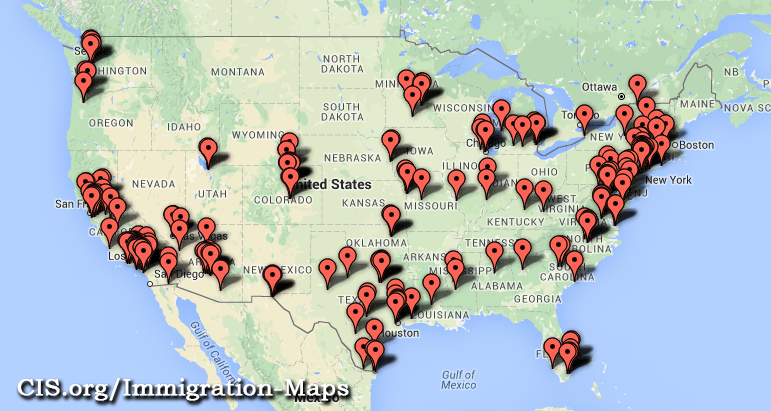How about next we pass a law in Congress, that it is against the law not to follow and apply the law? Imagine the government savings….and especially the lives saved….
Vaughn, CIS: In response to congressional inquiries, ICE has released information on some of the criminal aliens who have been released by the agency since 2010. Specifically, ICE provided information on aliens who were charged with homicides after being released and aliens who were released multiple times by ICE.

The criminal aliens released by ICE in these years — who had already been convicted of thousands of crimes — are responsible for a significant crime spree in American communities, including 124 aliens charged with 135 new homicides. Inexplicably, ICE is choosing to release some criminal aliens multiple times.
Only a tiny percentage of the released criminals have been removed — most receive the most generous forms of due process available, and are allowed to remain at large, without supervision, while they await drawn-out immigration hearings. They are permitted to take advantage of this inefficient processing even though they are more likely to re-offend than they are to be granted legal status.
There is a human cost to the Obama administration’s careless catch and release policies for criminal aliens, euphemistically known as “prioritization”. These policies have led to 124 new homicides since 2010, and thousands of other crimes that harm citizens and degrade the quality of life in American communities.

124 Aliens Charged With Homicide After Release Since 2010
A total of 121 criminal aliens who were freed by ICE over the five-year period between 2010 and 2014 were subsequently charged with homicide-related crimes within that time frame. (Three more were charged in 2015; see below.) These 121 accused murderers were associated with 250 different communities in the United States, with the most clustered in California, New York and Texas.

Source: ICE information provided to the U.S. Senate Judiciary Committee
View Image of Map
Some aliens had multiple zip codes associated with them in ICE’s system, so the records include more zip codes than the 121 individual criminal aliens charged through 2014. (Three more were charged in 2015; ICE did not provide their zip codes.)
These aliens were charged with a total of 135 homicide-related crimes after release. Two of them had homicide-related convictions even before they were released.

These aliens had 464 criminal convictions prior to release by ICE, ranging from drug crimes to DUI and other driving offenses to larceny and theft.
Another three aliens who were released by ICE during that time were charged with homicides during the first 10 months of FY2015, bring the total number of criminals aliens released by ICE who subsequently were charged with homicide to 124.
This tally does not include aliens who were released by sanctuary jurisdictions, nor those aliens that were released by local law enforcement agencies after ICE declined to take them into custody due to Obama administration prioritization policies. This list includes only those aliens that ICE arrested and then released.

The names of the criminal aliens were redacted by the Judiciary Committee, but the list presumably includes murderers like Apolinar Altamirano, an illegal alien who was arrested by ICE in 2013 following his conviction on local charges involving a burglary and abduction, but who was released on a $10,000 bond and permitted to remain free and elect to have deportation proceedings that would take years to complete. In January 2015 Altamirano shot and killed 21-year-old Grant Ronnebeck while he was working at a convenience store where Altamirano had come to buy cigarettes.

Aliens Released By ICE on Multiple Occasions Since 2013 Commit Hundreds of New Crimes
ICE reported that there are 156 criminal aliens who were released at least twice by ICE since 2013. Between them, these criminals had 1,776 convictions before their first release in 2013, with burglary, larceny, and drug possession listed most frequently.
The vast majority (124) of these criminal aliens were released in California. In addition, 16 were released in Arizona, six in Texas, three in Florida, two in Georgia, and one each in North Carolina, Massachusetts, Wisconsin, Washington, and Oregon.
These criminal aliens racked up a total of 243 additional convictions after being freed by ICE. The largest number (24) were for drunk or drugged driving, but they also included drug offenses, burglary, theft and larceny, and sex offenses.
ICE further disclosed that 47 of the recidivist aliens who were released at least twice had since been charged with an additional 106 crimes since their most recent release. So far, 20 have been convicted of crimes including burglary, dangerous drugs, DUI, fraud, and assault on a police officer.
Why Were They Released?
ICE has previously disclosed that 75 percent of the homicidal criminal aliens were released due to court orders, including the so-called Zadvydas cases, in which the alien’s home country would not take them back. The rest were released by ICE’s choice.
Of the 156 recidivists that ICE released at least twice, fewer than half (67) were released because their home country would not take them back, 16 were released on bond by an immigration judge, and 73 were released by ICE’s choice. ICE says it tried to contest only one of the releases ordered by an immigration judge — meaning that ICE essentially consented to more than half of these releases.
Of the 156, a total of 88 were released under “supervision”, 40 were released on bond, and 28 were released on an order of recognizance (without supervision).
In a separate communication, ICE provided a list of the countries that currently are uncooperative in accepting their deported citizens: Afghanistan, Algeria, Burundi, Cape Verde, China, Cuba, Eritrea, Gambia, Ghana, Guinea, India, Iran, Iraq, Ivory Coast, Liberia, Libya, Mali, Mauritania, Morocco, Sierra Leone, Somalia, South Sudan, and Zimbabwe.
Criminal Aliens Released in 2014 Were Convicted of 2,560 New Crimes
In 2014, ICE released a total of 30,558 criminal aliens from its custody. These aliens had already been convicted of 92,347 crimes before they were released by ICE.
As of July 25, 2015, a total of 1,895 aliens have been charged with a crime after being freed by ICE. As of that date, 1,607 aliens had been convicted of a crime after being freed by ICE. The total number of new crimes for which these aliens were convicted after ICE released them was 2,560.
These 2,560 new crimes by aliens ICE released instead of deported in 2014 include: 298 dangerous drug offenses, 185 assaults, 40 weapons offenses, 28 sex offenses, 10 sex assaults, four kidnappings, two arsons, and one homicide. There were 1,044 traffic offenses included in the list.
Only 3 percent of the Criminal Aliens Released in 2014 Have Been Removed
As of July 25, 2015, only 974 (3 percent) of the 30,558 criminal aliens freed by ICE in 2014 have been removed. Presumably some of these aliens are again incarcerated or in ICE custody following conviction for the 2,560 new crimes after their release by ICE.
However, ICE reports that 28,017 still had a pending immigration case as of July 25, 2015, suggesting that many of these released criminal aliens will remain here for some time under Obama administration policies that allow them to elect for drawn-out immigration court proceedings rather than accelerated forms of due process and removal.
In addition, there were 1,567 of these released criminal aliens who have been allowed to stay in the United States.
ICE’s full response to the Judiciary Committee’s inquiries can be found here.
Improved Reporting on Immigration Status of Criminals Needed
The public should not have to rely on members of Congress to demand information from federal immigration agencies about criminal aliens. Immigration status should be reported on a routine basis by all law enforcement agencies, so that federal authorities can respond appropriately when an alien is arrested, and so that the public can determine the true public safety impact of immigration policy. Legislation has been introduced by Rep. Mo Brooks (R-Ala.) that would remedy this problem.



